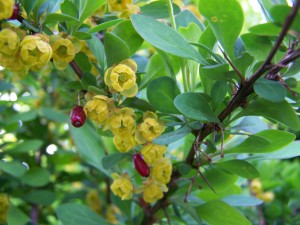Berberis vulgaris produces edible but sharply acidic berries, which people in many countries eat as a tart and refreshing fruit.
Contents
Uses
- Culinary uses: for making jam, jellies, and wine.
- Folk medicine
Benefits
- The fruit of Berberis Vulgaris is used for kidney, urinary tract, and gastrointestinal (GI) tract discomforts such as heartburn, stomachcramps, constipation, lack of appetite, liver and spleen disease; for bronchial and lung discomforts; for spasms; to increase circulation; to boost the immune system; and as a supplemental source of vitamin C.
- The bark, root, and root bark of Berberis Vulgaris are also used for disorders of the GI tract, liver, gallbladder, kidney and urinary tract, respiratory tract, and heart and circulatory system; to reduce fever; as a “blood purifier;” and for narcotic withdrawal.
- Berberis Vulgaris root bark is also used for liver problems, gallbladder disease, jaundice, spleen disorders, diarrhea, indigestion, hemorrhoids, kidney and urinary tract diseases, gout, joint pain (rheumatism), arthritis, mid- and low-back pain, malaria, and a parasitic infection called leishmaniasis.
Cautions
- Pregnancy and breast-feeding: Don’t use European barberry by mouth if you are pregnant or breast-feeding. It is LIKELY UNSAFE for your baby. The berberine in European barberry can pass from a mother’s body into her unborn child through the placenta. Brain damage has developed in newborns exposed to berberine. Similarly, berberine, as well as other harmful chemicals in European barberry, can be transferred to an infant through breast milk, and might cause brain damage.
- Bleeding disorder: Berberis Vulgaris contains a chemical called berberine. Berberine might slow blood clotting and increase the risk of bleeding. In theory, European barberry might make bleeding disorders worse.
- Diabetes: Berberis Vulgaris contains a chemical called berberine. Berberine might lower blood sugar levels. Watch for signs of low blood sugar (hypoglycemia) and monitor your blood sugar carefully if you have diabetes and use Berberis Vulgaris in amounts larger than the amounts normally found in food.
- Low blood pressure: Berberis Vulgaris contains a chemical called berberine. Berberine might lower blood pressure. In theory, taking Berberis Vulgaris might make blood pressure become too low in people with low blood pressure.
- Surgery: Berberis Vulgaris contains a chemical called berberine. There is concern that berberine from European barberry might prolong bleeding, slow down the nervous system, and interfere with blood sugar control during and after surgery. Stop taking European barberry at least 2 weeks before a scheduled surgery.
Interactions
- Cyclosporine (Neoral, Sandimmune) interacts with Berberis Vulgaris
The body breaks down cyclosporine (Neoral, Sandimmune) to get rid of it. European barberry might decrease how fast the body breaks down cyclosporine (Neoral, Sandimmune). This might cause there to be too much cyclosporine (Neoral, Sandimmune) in the body and potentially cause side effects. - Medications changed by the liver (Cytochrome P450 3A4 (CYP3A4) substrates) interacts with Berberis Vulgaris
Some medications are changed and broken down by the liver.
European barberry might decrease how quickly the liver breaks down some medications. Taking European barberry along with some medications that are broken down by the liver can increase the effects and side effects of some medications. Before taking European barberry, talk to your healthcare provider if you are taking any medications that are changed by the liver.
Some medications changed by the liver include cyclosporin (Neoral, Sandimmune), lovastatin (Mevacor), clarithromycin (Biaxin), indinavir (Crixivan), sildenafil (Viagra), triazolam (Halcion), and many others.
Other names
Agracejo, Barberry, Berberidis Cortex, Berberidis Fructus, Berberidis Radicis Cortex, Berberidis Radix, Berbéris Commun, Berberis jacquinii, Berberis sanguinea, Berbéris Vulgaire, Berberis vulgaris, Berberitze, Berberry, Berbis, Common Barberry, Épine-Vinette, Espino Cambrón, Jaundice Berry, Mountain Grape, Oregon Grape, Pipperidge, Piprage, Sauerdorn, Sow Berry, Vinettier
References
Wikipedia, https://en.wikipedia.org/wiki/Berberis_vulgaris

